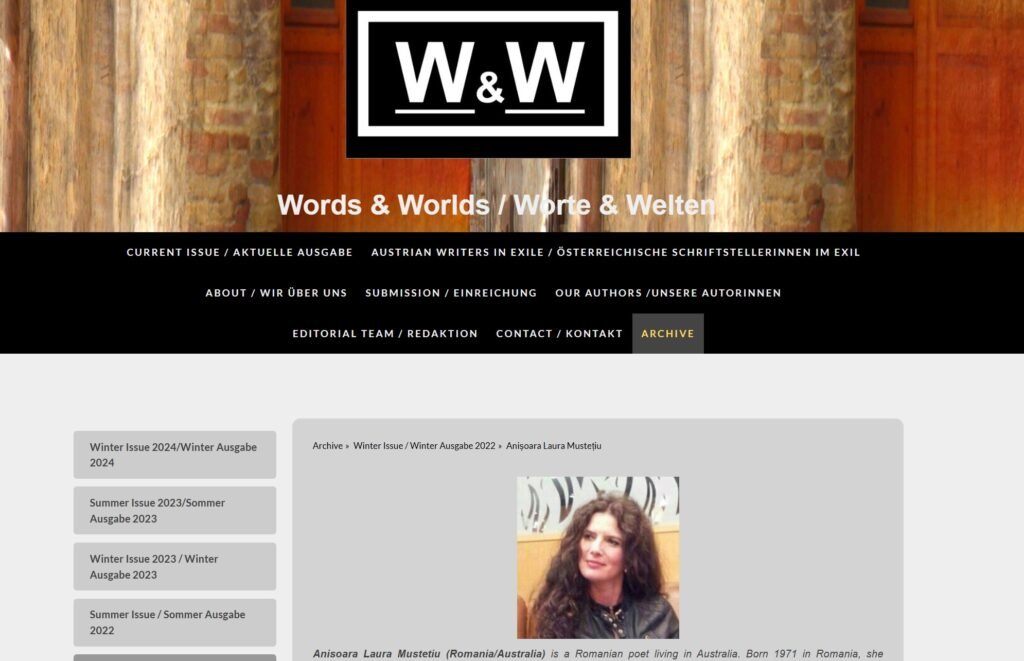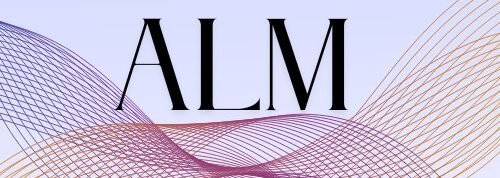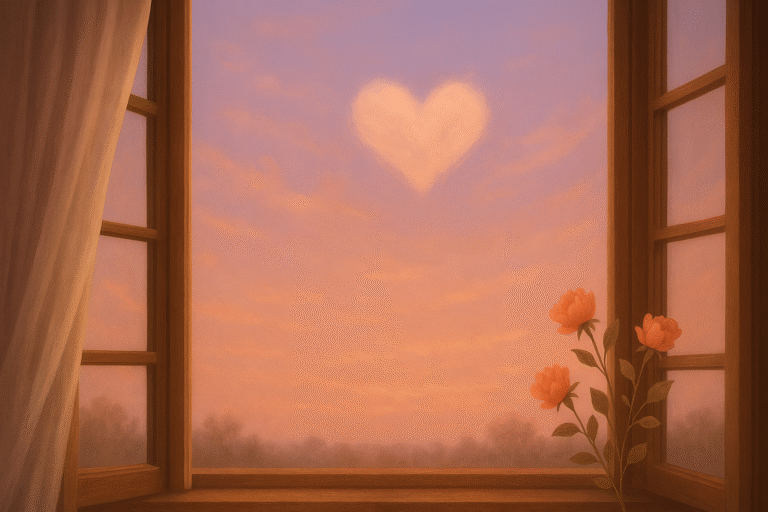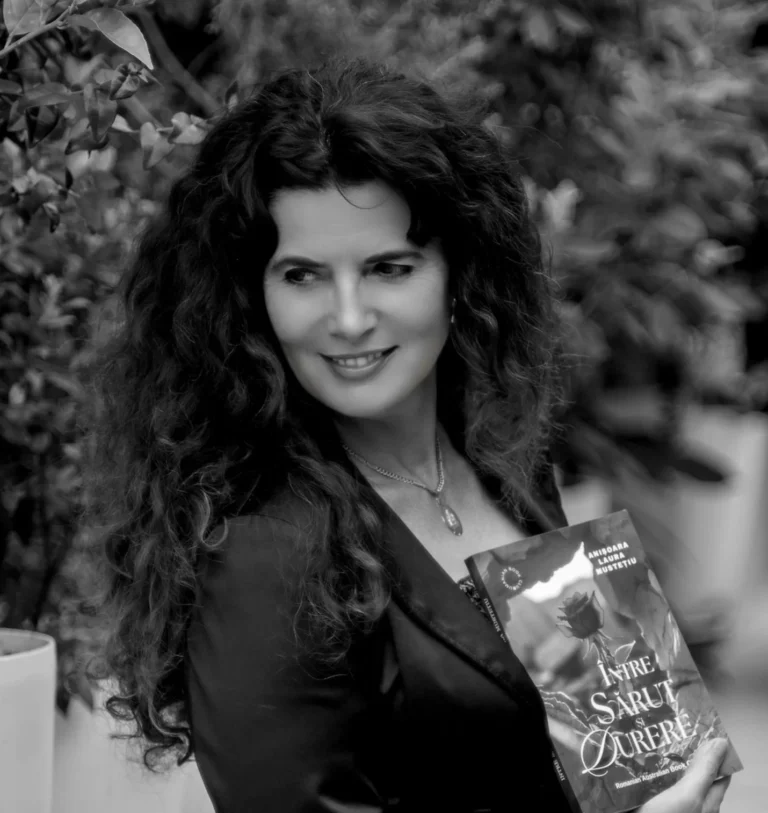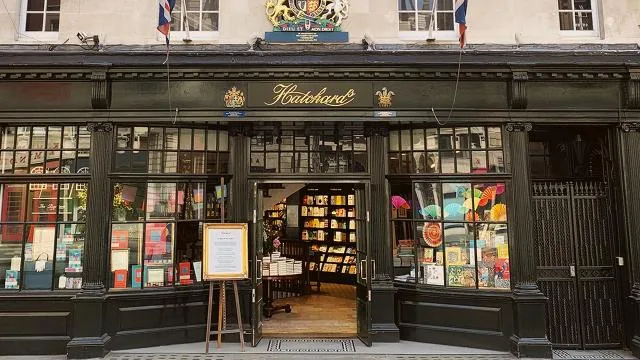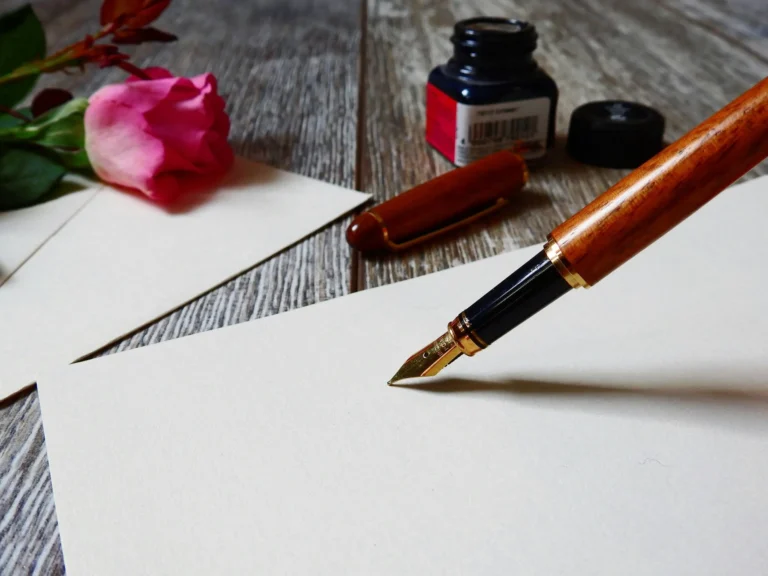Forgotten among foreigners – Anisoara Laura Mustetiu
Excerpt from the book Fragments of a woman’s life, A collection of true stories, Anisoara Laura Mustetiu.
A gust of wind swept gently over the blossoming cherry tree, causing its branches to tremble and brush against the tall windows of a massive white building. A glossy sign in bold white, red, and blue letters marked its purpose: American Fitness, Speyer, Germany.
From the first floor, a young woman in her mid-thirties pedaled on a professional indoor bike, her gaze drifting toward the cherry tree outside. She longed to inhale the crisp freshness of the wind, but instead, she was met with the thick, sweat-laden air circulating in the fitness room. Ana’s muscles were taut, fully engaged in riding her Tomahawk spin bike at an intense pace. A bead of sweat slipped down her forehead, landing on a rebellious brown curl that had escaped her ponytail, tickling her cheek. Another droplet rolled onto the bike’s steel frame before falling onto the cognac-brown parquet. Her velvety cheeks flushed a healthy red—evidence of vigorous circulation, despite the late hour. She wore a black t-shirt and cycling shorts adorned with red and yellow stripes—the colors of the German flag.
Ana’s eyes scanned the spacious gym. Near the entrance, two men in their forties erupted into laughter. One of them clutched his gold-rimmed glasses, keeping them from slipping off his nose. A plaque on their table bore an unmistakable inscription: Commission of Guinness World Records.
Outside, just a few feet from the entrance, two doctors sat on a brown leather couch, engaged in conversation. Every so often, their gazes drifted toward the cyclists, observing their movements and performance from afar. Standing at the room’s entrance was a tall man with an athletic build, likely in his thirties. His piercing blue eyes remained fixed on the unfolding scene of endurance and determination—he was the trainer. The relaxed expression on his face hinted at how much he was savoring his late-night coffee.
The room’s interior was painted a vibrant shade of orange—a refreshingly bold contrast to the sleek black Tomahawk bikes positioned in the center, as well as the black, red, and yellow cycling attire worn by the ten athletes. In the corner, beside a tall green plant, stood a silver stereo, its wires connecting to two massive loudspeakers set on either side.
“Weeee willllll,
Weeee willlll rock you!
Weeeee willlll rock yooooou!”
Queen’s electrifying voice blasted through the speakers, fueling the energy in the room.
Ana took a deep breath, pushing herself forward with rhythmic determination. As she rode, she observed the other cyclists in the group. Each person radiated a quiet focus, carefully controlling every ounce of energy, every precise movement of their ride. Maintaining the correct posture was essential—any deviation could have serious consequences. Their journey wasn’t over yet; they still had a long stretch to cover at high speed to reach their dream. But they were no strangers to pain, exhaustion, or the emotional highs and lows that came with training. Over countless hours of preparation, they had learned to embrace both triumph and struggle.
Ana glanced at the fitness watch on her wrist—her pulse remained stable at 120 bpm. Soon, she would need to lower it without slowing down, conserving energy as efficiently as possible. She was skilled at this. For years, she had immersed herself in books on the power of the mind, training mentally to harness the discipline she knew would carry her through this intense, unpredictable night—a night in which she would confront her true limits.
During her last training session, Ana had proven her physical endurance: sixteen hours of cycling at an average speed of 40 km/h. But now, everything was different. She was competing, and the pressure was immense. Stopping was not an option—if she did, it would all be lost. The grueling hours of training, her deepest longing to test her physical and mental strength, her search to understand who she was and what she was capable of—everything could disappear in an instant.
Her father once told her, “Life is like a dance of seasons.” Ana had grasped the meaning early on. She had learned to move with the rhythm, to embrace the cold and frost as much as the warmth of sunny days. She had never expected life to be easy. Tonight, she wished her father were with her. Instinctively, she looked up. He would smile from there, from heaven, she thought. “Dance, dance to the rhythm of life,” he would say. And he would be right—because this night was pure rhythm, a test of mental strength and revelation.
A sudden shiver of fear ran through her, sharp yet fleeting. She remained steady, pressing forward. Years of training had taught her that this feeling was natural—a brief visitor that always passed. She knew how to face it, to let it dissipate without breaking her rhythm. Buddhist meditation had trained her in the art of observation, in harnessing negative emotions and transforming them into fuel. Over time, meditation had become an essential pillar of her endurance—her gateway to inner peace, the mental force guiding her through this grueling twenty-four-hour challenge.
“Ana, are you okay? You look a little pale,” Ben asked, his voice gentle as he touched her shoulder. His eyes searched hers, seeking reassurance.
“Yes, just some sore muscles in my legs. Nothing special.”
“Okay. I trust you. You’re strong. Relax your mind.”
Ben walked away, his gaze sweeping across the room with quiet curiosity. The two commissioners from the Guinness Book had stopped laughing. Fatigue weighed on them now, their eyes fixed on the cyclists, watching the relentless rhythm of their movements.
Ana’s muscles burned with growing intensity. The hardest part was the heavy, stifling air. She needed fresh oxygen—her body craved it—but stepping outside wasn’t an option. If she stopped, even for a moment, exhaustion would crash over her like a tidal wave, dragging her down, stealing the competition from her grasp. She rode above the saddle, hips pulled back, upper body bent forward, gripping the handlebars with practiced precision. She focused on relaxing her shoulders, letting the tension dissolve into movement. Then, she allowed her thoughts to slip beyond the present, drifting across time and space.
Scenes from the past unfolded behind her closed eyelids—memories rising like ghosts. She saw her grandparents in Transylvania, felt the familiar pulse of Timisoara, the city where she was born. She loved her city. Yet, a sharp pang of pain cut through her chest. If only her parents were alive, everything would be different. She wouldn’t have known hunger, poverty, loneliness. If they were here, the pack of ‘wolves’ would never have dared to leer at her with their ravenous eyes. They said her femininity was to blame. But Ana knew the truth. It was never her beauty, never her femininity—it was poverty, the absence of protection, that had made her vulnerable. Had she stayed, those ‘wolves’ would have devoured her. Only in a foreign land, far from their burning gaze, had she finally felt safe.
Yet, Timisoara would always remain in her soul—indispensable, rebellious, beautiful, tender, and painful, all at once.
Ana shuddered as the memories resurfaced. Compared to them, the pain of the cycling competition felt trivial—insignificant. She considered herself lucky to be here, far from the people of her city, lucky to be forgotten, left in peace among strangers. Over the years, her only companions had been books—the silent mentors that had taught her a foreign language and, more importantly, the ability to recognize and seize even the smallest opportunities. She had worked relentlessly, sacrificed much, and pursued her goals with unwavering determination. But the greatest victory of all was learning to stand on her own—to become an independent woman who earned her living alone. That, above everything, filled her with endless pride.
She cast her gaze across the fitness room. Like her, the other cyclists were visibly drained. The ache in her muscles had grown unbearable. Outside, a crowd had gathered, cheering them on during these final hours of the ride. Yet, despite the support, the cyclists had to maintain absolute mental discipline—to remain composed, conserve energy, and push through the exhaustion.
A journalist and a cameraman from ZDF entered, their presence stirring a subtle shift in the room. They began filming, weaving between the cyclists, capturing fragments of their struggle, their endurance. Eventually, Ana found herself in front of the camera.
“What is the secret behind such an incredible performance?” the journalist asked.
Ana only murmured, a weary smile playing on her lips:
“My mind, I think. Just the power of my mind.”
But now, with the cameras gone and the room settling back into its rhythm, Ana felt as if she had stepped onto treacherous, unfamiliar terrain. The two-minute interview had drained the energy she had so carefully preserved for the final stretch. Her mind grew foggy, her breath ragged and strained. A crushing fatigue weighed her down, pulling at her limbs with relentless force. She felt heavier and heavier, as if teetering on the edge of a deep abyss.
She shook her body, desperate to fight off the sensation. Droplets of sweat scattered like rain onto the ground. In that moment, she knew—she had reached the limits of her power. A decision loomed before her, stark and unforgiving. With each movement, she felt strength slipping away, draining from her body like sand through open fingers. Tears welled in her eyes, streaming down her pale cheeks.
No, I’m not… I’m not giving up, a voice thundered from deep within. Nooooo! This is not the end. I have to move on.
The voice was fierce, commanding, unlike anything she had ever heard within herself. It carried an unfamiliar force, as if unlocking a hidden reservoir of strength—an untapped realm she had never before entered.
Within moments, the heaviness began to lift. Her body felt lighter, her mind clearer. She glanced at her watch—120 bpm. It’s going well, she thought. Now, she only had one task left: maintain the pace.
Dark circles shadowed her brown eyes, deepening their intensity. Her mind searched desperately for refuge—a quiet, safe haven beyond the reach of physical pain. As exhaustion pulled at her, she drifted, slipping through time and space.
Within moments, she saw herself as a child, standing in her grandparents’ yard. The scent of polenta and mushroom stew filled the air as her grandmother cooked, while her grandfather sang softly, the rhythmic swish of his scythe blending with his melody as he mowed the grass. Ducklings waddled in circles, their downy yellow fluff gleaming in the sunlight. Among them, two stood out—black with a bright yellow spot on their backs. She giggled at the sight of their tiny carroty legs, their mismatched charm making them irresistibly adorable.
Reaching deep into the pocket of her flowered yellow dress, she pulled out a handful of wheat grains and scattered them onto the ground. The chicks rushed forward, pecking eagerly, their tiny beaks snapping up every morsel. She laughed with uncontained joy, jumping and clapping her little hands, caught in the pure delight of the moment.
Suddenly, the music pulled her back to the present. ABBA’s song resounded loudly:
“The winner takes it all,
The loser standing small,
Beside the victory,
That’s her destiny…”
Ana lifted her head, giving her body a quick shake as if snapping herself out of a trance. She was still riding at the same steady pace, her determination unwavering.
Meanwhile, a surge of people poured into the fitness room, their voices rising in a deafening chant:
“Victory! Victory!”
Ana stared in astonishment as camera flashes illuminated the room, capturing the moment in rapid succession. A few newspaper journalists snapped photos hurriedly, their excitement fueling the growing commotion. She watched, amused, as the energy in the room shifted—voices rising, movements quickening, as if the very air had come alive.
Then, a voice rang out, announcing her name among the winners. Her entire body trembled. She had done it—she had set a 24-hour World Record in indoor cycling. The date: March 17, 2001.
Warm, crystalline tears spilled down her cheeks. They carried the weight of joy, the depth of triumph—a moment so rare, so profound, it would remain forever etched in her memory.
As her gaze drifted toward the window, she saw two white, fluffy clouds hovering gently over the vast blue sky. They moved slowly, almost deliberately, as if dancing—a dance in perfect harmony with life’s rhythm.
In that instant, she felt it. The scars she had carried within her had vanished. A quiet peace settled in her heart, and Ana’s lips curled into a smile.
Published in Words and Worlds Magazine / Worte und Welten, Winter Issue 2022, Austria.
